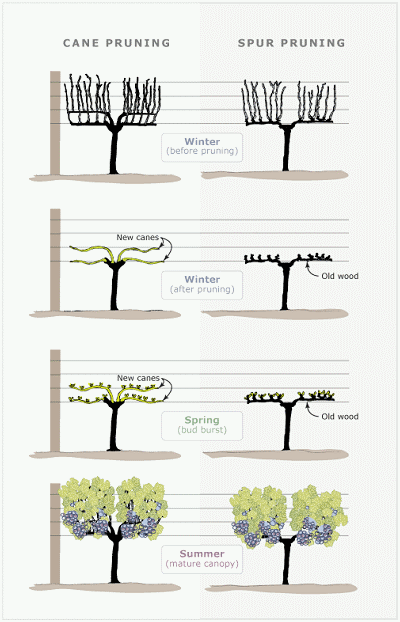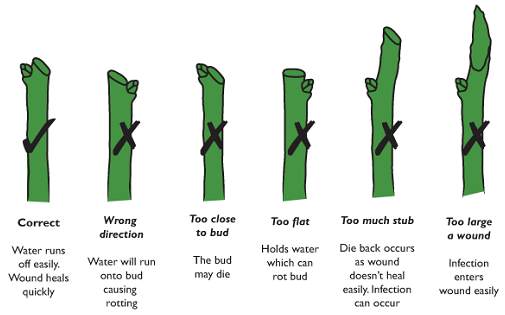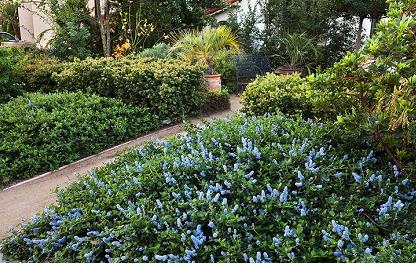| |
| |
 | El Nino Important Landscape and Gardening tips
|
|  |
|
 |  Just because your property is on a relatively flat area doesn't mean that it is not subject to some kind of flood damage. Actually, properties on flat land are often much harder to have good functioning drainage installed on because the property does not provide adequate fall for the water to flow downstream into drains or naturally. We should all be taking a look at our properties and getting prepared prior to a devastating storm. The article on our website has lots of tips and possibly things you did not think about as we pray for lots of rain but without the damage. |
|  |
 | |  |  | |  |  |  GrapesIt is time to prune grapes while they are dormant. Cane and spur pruning are the most popular. If you are growing the vines on a trellis or pergola use the same theory.  Raspberries Prune low chill Raspberry canes down to 3 to 4" tall new growth will sprout from ground in sprin. Prune Dormant Roses Clean up dead, diseased, or crossing branches; then cut back canes by about 1/3, trimming just above outward-facing canes. Roses will grow in the direction the last bud is facing; Your goal is to get the shrub to grow outward not into itself.  Iceberg Roses Iceberg roses do not need to be cut back as these are used more as a shrub. They will respond well to being cut back especially in locations that you are trying to keep the height of the shrub lower Climbing Roses Climbing Roses should not be cut down like your dormant roses. They can even be cut with hedge sheers. Some time spent inside out pruning will pay dividends next spring though. Plant and Water Natives Some think this is the best month to plant California natives. It's also a good time to sow seeds of California wildflowers. Water California Natives if they have not received any rain. Azaleas and Camellias: Plant, Transplant, and Rejuvenate Azaleas and Camellias (right) are at their peak now. Shop for the colors and forms that you want plant right away. Now is also the time to move established plants. Esteban (Garden View Maintenance Supervisor) says that struggling older azaleas can be rejuvenated by digging around the old root ball and adding sufficient quantities of peat moss in the soil. |
|  |
 | |  |  | In the Garden of Ian: Mulch for Erosion Prevention
|
 With winter approaching and El Nino buzz being blasted at us from every media outlet, including this one; many minds are focused on erosion. Will El Nino wipe out my hillside? What do I plant now to prevent this from happening? Well, it is a little late for planting to have much effect on stopping erosion this winter. There is not enough time for new roots to take hold, and digging into an eroding hillside will just loosen the dirt and could add to the problem. Mulching is one of the best defenses against erosion and also has other benefits. Mulch is any organic plant matter, such as woodchips, leaves, bark, or compost, used as a top layer on the soil. This layer acts like a sponge. When rain falls, it will be absorbed into the mulch and soil, as opposed to it running off and eroding in the process. Even more importantly, the mulch breaks down and locks together creating a soil web. This carbon matrix of mulch is inhabited by strands of beneficial fungi and other microbe colonies gluing together the soil, creating your soil sponge. I suggest a 4" mulch layer. 1"- 2" of compost followed by 2" of shredded bark or woodchips is ideal. If your hill is extremely steep or in bad condition you may consider an erosion control blanket made out of organic material like straw fiber, or using a jute netting stapled over the top of the mulch. Mulching increases soil fertility and retains water making exiting plants happier, and giving you a jump start on planting and beneficial organic material for the existing plants after the heavy rains. |
|  |
 | |  |  | Blake's Landscape Maintenance Blog
|
 Believe it or not, there has been a massive, significant benefit to this devastating drought! People have actually begun to listen and buy into the irrigation concepts we have been preaching about all this time! Maybe it is the hardcore physical evidence the drought has given me or maybe it is just a general desperation to avoid the whole 2016 Mars Chic aesthetic, but it seems to be sinking in. The key has been and will continue to be deep, infrequent watering for healthy drought tolerant landscapes. The drought has been a major pain in the @$$, but, it has also encouraging to see that our jobs which have been visually impacted the hardest by the drought are the ones that we have had for around 2 years or less. The challenging part being the calls saying "Blake, we hired you because Garden View, and particularly you, are just so totally awesome and the best around. But my grass looks like $#*@!! What gives??" Well, I wish deep root systems grew faster and this drought has demonstrated to me just how long it can take. Typically, without water restrictions, we would be easing into less frequent watering as we train the roots down but this year was straight up cold turkey. Now, I'm not gonna say our turf is looking perfect by a long shot, but I am really proud of how well most of our turf areas have held up on just 1-3 days of water per week. Having trained these roots deeply has made all the difference in how resilient our landscapes have been in the heat and with a lack of water. Deep watering has a massive impact on all trees and shrubs, not just turf. Properly irrigated and rooted trees are much more structurally stable and will be more resilient to both wind and heavy rain which appear to be next of our upcoming Egyptian Plagues. Apocalyptic level rainfall or normal, bring it on. We are ready and I'm tired of all this drought crap. |
|  |
 |  | |  | |
 | © 2015. All Rights Reserved. |
|  |
|